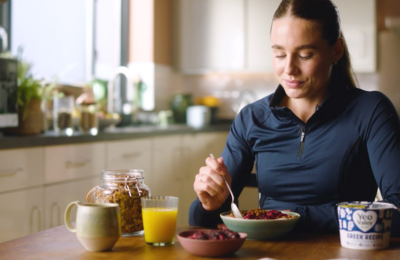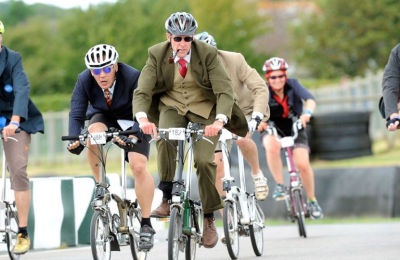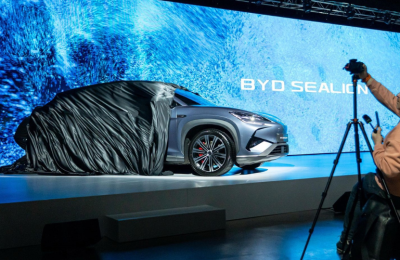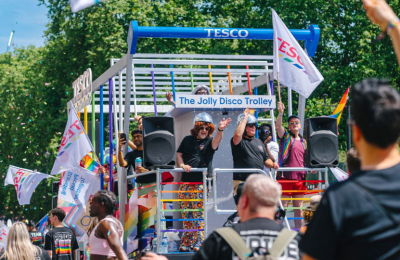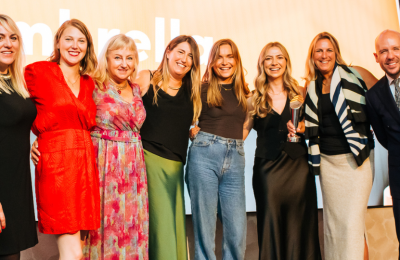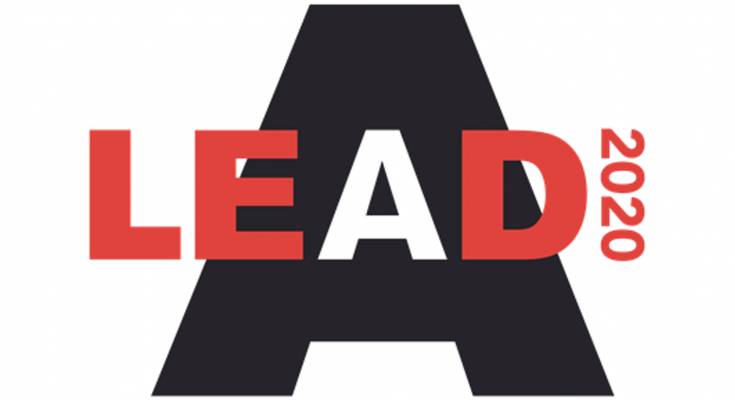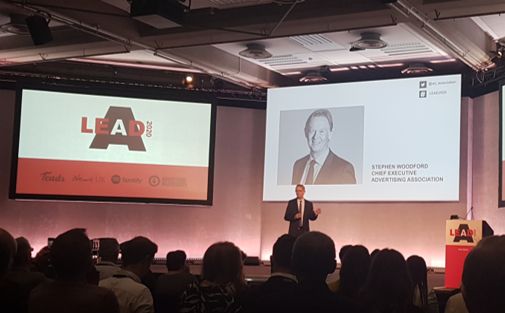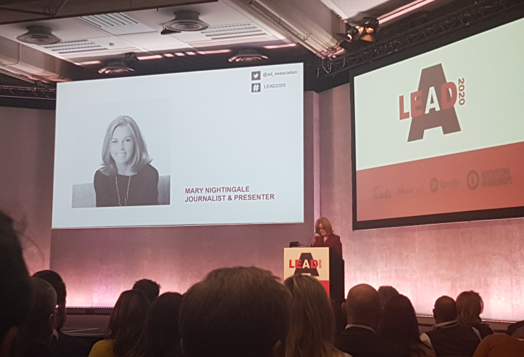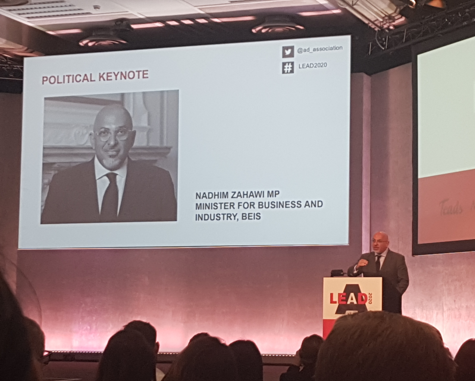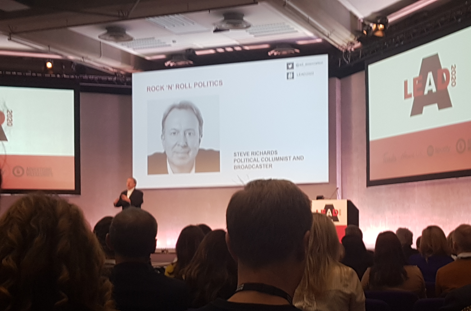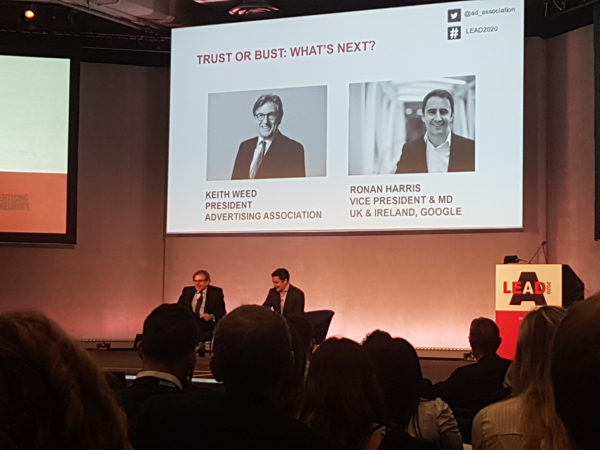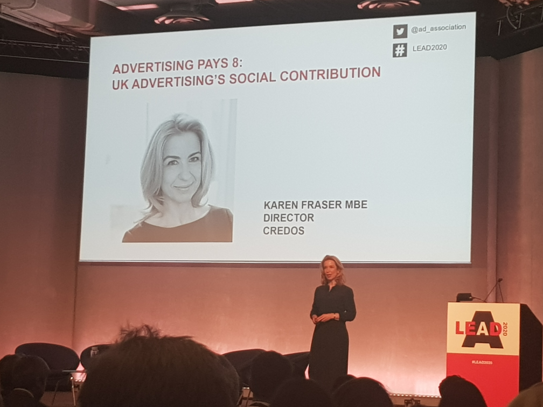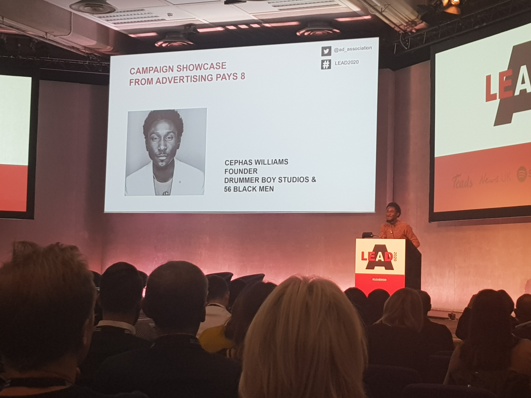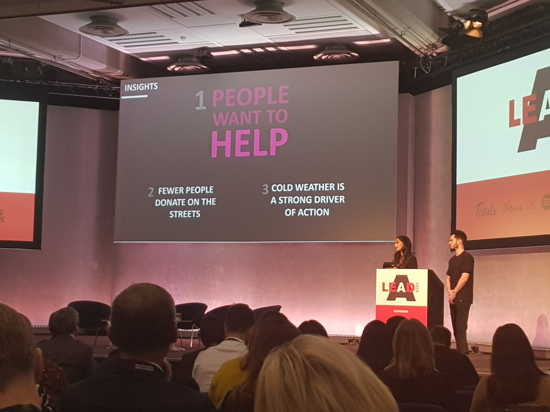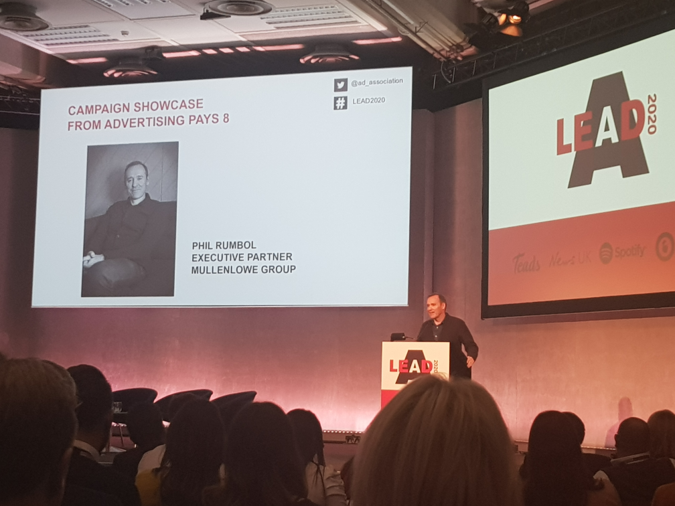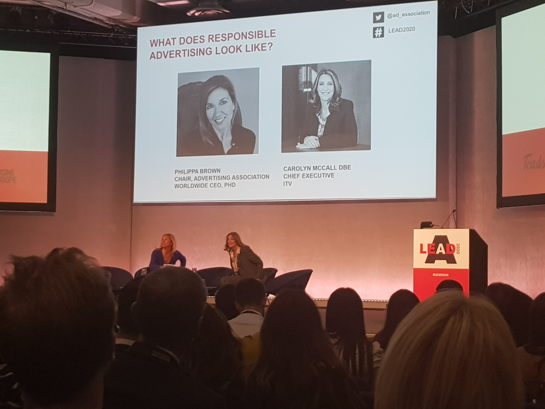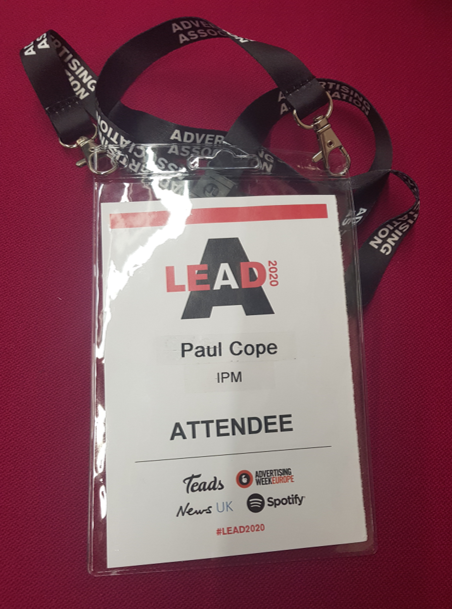On Thursday 30th January the Advertising Association held its ninth annual politics and advertising mash-up, LEAD2020, at the Queen Elizabeth II Centre, Westminster.
This year’s theme was The New Age of Responsibility, and the summit explored what this means for our industry via a series of expert presentations, interviews and panel discussions. As industry trade body members of the AA, the IPM was there to soak it all up.
The IPM’s Managing Director, Paul Cope, shares what happened and what it means for our industry…
Never afraid to address the big, important themes of the moment, LEAD2020 took on arguably the weightiest and most topical of them all – The New Age of Responsibility – at last week’s annual advertising industry summit, and asked: what does it mean, why is it important, and how on earth do we all get involved?
For the four hundred or so industry professionals in attendance (of which I was one), the Advertising Association had arranged 11 presentations, interviews and panel discussions over four hours, featuring 19 expert speakers from 16 organisations, to inform, discuss, and debate all aspects of the issue. Not to mention providing some insight and inspiration for how we can all make a difference.
Below is a summary of what went down – including links to key documents – followed by my own observations, musings and learnings…
OPENING ADDRESS
Stephen Woodford, Chief Executive, Advertising Association
First on stage to welcome the room and set the scene for the morning was the AA’s Chief Executive, Stephen Woodford…
- Woodford opened by quoting AA President, Keith Weed: “Without trust, advertising is just noise”.
- He pointed out that being responsible is a collective effort to ensure we meet the expectations of consumers, and requires us to focus on our role in society.
- He launched the AA’s new mission: ‘To promote the role and rights of responsible advertising and its value to people, society, business and the economy’.
- The three-year plan, covering responsibility, trust and growth, was outlined.
- He also mentioned that this week saw the launch of two new AA action groups, addressing:
- Reducing advertising’s carbon footprint for more sustainable growth.
- The latest WARC data report for the UK advertising industry (showing 5.2% growth and £26.1 billion spend)
WELCOME FROM THE CHAIR
Mary Nightingale, Journalist and Presenter
The MC and ruthless timekeeper for the morning was journalist and presenter, Mary Nightingale…
- Nightingale spoke about the importance of personal accountability when delivering change.
- She warned that the industry should expect scrutiny now more than ever.
- To further set the scene, she quoted Evan Davis’s simple call-to-arms from last year’s LEAD: “If you want to be trusted, be trust-worthy”.
POLITICAL KEYNOTE
Nadhim Zahawi MP, Parliamentary Under Secretary of State, Department for Business, Energy and Industrial Strategy
The summit’s first keynote speaker was Nadhim Zahawi MP, who challenged the UK advertising industry to “do even better”…
- Zahawi laid out the three main post-Brexit government objectives to support the UK advertising industry:
- Build new trading relationships across the globe
- Promote the service sector as a key area of UK expertise
- Maximise the role of the AA’s UK Advertising Export Group initiative
- He described the need to sharpen the focus on diversity and inclusion.
- He praised the AA’s TimeTo initiative, saying it is doing a positive job for the advertising industry…
- …but, to make a genuine difference, the right choices must also to be made both on a company and an individual level.
ROCK ‘N’ ROLL POLITICS
Steve Richards, Political Columnist and Broadcaster
Next to the stage was broadcaster and columnist Steve Richards, who gave an irreverent, behind-the-scenes take on the current UK political landscape…
- He began with an insight: in politics, the seeds of future issues are always sewn during the ‘honeymoon period’ (much like the one Boris is enjoying at the moment).
- The supporting example he gave was how the positive early few months of Theresa May’s government was, in fact, notable for poor decisions made regarding Brexit – which ultimately led to her downfall.
- With Boris, he warned that the seeds of future tension with political adviser Dominic Cummings are being sewn with their conflicting opinions on HS2.
- He explained that, despite Brexit happening on 31st January, the 2020 EU trade talks will likely be cosmetic at best – 2021 will be when the big challenges occur – and that trade is usually the root of most tension within the Conservative party.
- Finally, he pointed out that the key to success for all political leaders is a commitment to answering the ‘why’.
KEYNOTE
Rt Hon John Bercow, 157th Speaker of the House of Commons
The fifth speaker of the morning, the Rt Hon John Bercow, proved to be a hugely entertaining storyteller, sharing anecdotes from the corridors of power and giving advice on implementing change…
- To kick off, Bercow asked: what is responsible leadership?
- His answer? “Pursuing necessary, desired and overdue innovation – keep the best, improve the rest”.
- He talked through the three most significant changes he implemented while Speaker of the House of Commons:
- Innovation in the chamber (e.g. reintroducing ‘urgent questions’ to ministers)
- Parliamentary estate reviews (e.g. introducing a children’s nursery at the Palace of Westminster, encouraging visits by young people, promoting BAME recruitment) – remember: it’s action that inspires culture
- Chairing the UK Youth Parliament
- He explained that controversy always comes with true change, and leaders can either commit to innovation or go along with the status quo – but never both.
- He emphasised the need for leaders to take personal responsibility for change and expect to not always be popular…
- …but also to not underestimate the importance of having like-minded allies.
- Most importantly: maintain your focus and keep going, no matter what.
TRUST OR BUST: WHAT’S NEXT?
Keith Weed, President, Advertising Association
Ronan Harris, Vice President and MD UK & Ireland, Google
For the first interview of the summit, the AA’s Keith Weed shared the stage with Ronan Harris from Google, and they discussed the declining public trust in advertising and the role of the Trust Working Group in addressing it…
- Harris described how consumer trust in the online ad world had been broken, which is why the TWG made a commitment to listen to everyone affected and communicate a clear path to the necessary improvement.
- Weed listed the key positive and negative drivers of trust in advertising:
- Positive: creativity/entertainment (25%), social contribution (8%), information (8%), value exchange (4%), other (2%)
- Negative: bombardment (21%), sensitive sectors & vulnerable groups (16%), intrusiveness (8%), ‘suspicious’ techniques (5%), ‘unhealthy’ advertising (3%)
- Weed then talked through the AA’s 5-point action plan to address the negative drivers:
- We will reduce advertising bombardment
- We will reduce excessive ad frequency and re-targeting
- We will show that advertising is well regulated by the ASA and that it is ‘best in class’
- We will ensure that data privacy matters
- We will show that advertising can drive social change
- Finally, both speakers discussed the need to bring political advertising into the ASA’s regulatory process.
- The full Trust Action Plan can be downloaded HERE.
ADVERTISING PAYS 8: UK ADVERTISING’S SOCIAL CONTRIBUTION
Karen Fraser MBE, Director, Credos
After a short break, Karen Fraser MBE ran through some of the key findings of the Advertising Pays 8 report, which seeks to help us understand advertising’s contribution to UK society…
- Fraser began by stating that trust in advertising has been in decline since the early 1990s, and that this report was commissioned to collate data and insight on current public opinion to help inform action.
- The research methodology included 36 face-to-face consumer interviews, over 1,000 online consumer questionnaire responses and a series of industry interviews.
- Overall findings:
- 46% of respondents believe advertising has a positive impact on UK society
- 42% believe advertising can help make the world a better place
- “What drives public perceptions of advertising’s impact on society?”:
- Raising awareness and/or money for good causes (45%)
- Encouraging individuals to seek help or make changes in order to lead healthier, happier lives (31%)
- Bringing people together around important cultural events/messages (30%)
- Promoting products and services that are good for society/the planet (30%)
- Promoting a more harmonious society/representing society in a positive way (25%)
- “I think more highly of any for-profit company that tries to make a positive impact to society through advertising”:
- Disagree (14%)
- Agree (53%)
- “How important is it that the advertising industry contributes positively to society?”:
- Don’t think it is important (3%)
- Think it is important (97%)
- However, the research also found that most people think the industry should be doing more:
- Occasionally does enough (53%)
- Rarely does enough (26%)
- Never does enough (11%)
- Fraser pointed out what the UK industry is already doing: agencies give 3% of time to pro-bono work worth £75m and £1bn worth of media inventory and resources.
- Looking ahead, there is public appetite for more advertising across a wide range of social issues, including: mental health (63%), the environment (59%), domestic violence/abuse (58%) and homelessness/poverty (55%).
- In summary, Fraser stated:
- Consumers believe advertising can make the world a better place
- There is industry enthusiasm to drive more social change
- The opportunity to re-build public trust is clear, but only if we all take responsibility
- The full Advertising Pays 8 report can be downloaded HERE.
CAMPAIGN SHOWCASE 1: 56 BLACK MEN
Cephas Williams, Founder, 56 Black Men
Next to the stage was the first of three campaign showcase presentations from Advertising Pays 8: the very engaging Cephas Williams taking us through the story behind 56 Black Men…
- Williams opened with a challenge to the industry: “Let’s change the narrative for life”.
- He explained that diversity of thought in advertising and marketing is essential.
- He suggested that the government’s anti-knife crime message on chicken boxes and Kendall Jenner’s Pepsi ad are perfect examples of why we need authentic representation in our industry.
- This authenticity should inform each stage of decision making from ‘Information’ to ‘Understanding’ to ‘Belief’ to ‘Action’, and this was the inspiration to create 56 Black Men.
- He finished with a look to the near future: a live event and content stream where positive stories can be amplified.
- Learn more about 56 Black Men HERE.
CAMPAIGN SHOWCASE 2: WHATEVER THE WEATHER, HOMELESS PEOPLE DESERVE BETTER
Puja Parmar, Senior Marketing Manager, Mayor of London
Luke Walker, Creative Director, Weber Shandwick
The second campaign showcase featured Puja Parmar from Mayor of London and Luke Walker of Weber Shandwick telling us about the Whatever the Weather, Homeless People Deserve Better campaign…
- Parmar opened with a re-cap of the campaign origin, the insights derived from research, and the desired consumer actions:
- Campaign origin: the problem of rough sleepers on London’s streets is getting worse – something needs to be done now
- Research insights: people want to help, cold weather is a strong trigger for people wanting to help, on-street donations are declining (due to people carrying less cash)
- Desired consumer actions: donate, refer to Streetlink.
- Walker then took us through the campaign idea and execution:
- Idea: night-time weather forecasts delivered by those who are most affected by night-time weather – the homeless
- Execution: radio, press and OOH night-time forecasts and weather warnings, supported by outside card tap units to enable immediate donations
- Parmar closed by running us through the fantastic results;
- 48,631 actions (target = 10K)
- 245K+ donations
- 19,361 referrals (up from 8K the previous year)
- Learn more about the campaign HERE.
CAMPAIGN SHOWCASE 3: WE ARE THE NHS
Phil Rumbol, Executive Partner, MullenLowe Group
The third and final campaign showcase – We are the NHS – was presented by Phil Rumbol, who stood in for MullenLowe London’s Chief Strategy Officer, Jo Arden…
- Rumbol opened by explaining that to boost recruitment of nurses to the NHS, it was essential to change the existing NHS narrative of ‘perpetual crisis’.
- The strategy was to establish a contemporary, powerful employer brand for the NHS – the sweet spot between marketing and responsibility.
- For it to work, the campaign had to be personal to individuals as well as feeling like a big idea to the wider world.
- Also key to the challenge was changing the perception of male nursing as a credible career – men represented less than 10% of all nurses in the UK.
- To wrap up, Rumbol outlined some of the impressive results:
- The campaign achieved a 6% year-on-year growth of nurse recruitment, reversing a long-term decline
- For male nurses, that growth number was 8%
- Learn more about the campaign HERE.
WHAT DOES RESPONSIBLE ADVERTISING LOOK LIKE?
Carolyn McCall DBE, Chief Executive, ITV
Philippa Brown, Chair, Advertising Association & Global Chief Executive, PHD
For the second interview session of the morning, PHD Global Chief Executive Philippa Brown spoke to Carolyn McCall DBE, Chief Executive of ITV, about what responsible advertising looks like…
- McCall pointed out that expectation is growing across the UK population – not just millennials – that advertising and media need to help reflect and shape society more actively.
- She gave two clear tips to brands for how to do this:
- Focus on authenticity – always be honest
- Creating values via advertising is not credible – it should only ever be used to augment purpose
- McCall then gave an insight into ITV’s future focus areas:
- A continued commitment to quality content
- Build on the success of 2019’s Britain Get Talking campaign – the mental health awareness initiative which paused an episode of Britain’s Got Talent to encourage families to talk to each other and recognise the importance of communication in mental well-being
- Learn more about the Britain Get Talking campaign HERE.
DATA TRANSPARENCY AND ACCOUNTABILITY
Simon McDougall, Executive Director Technology Policy & Innovation, ICO
The final presentation of the summit came from Simon McDougall of the UK’s data police, the ICO, who explained his organisation’s expectations of good data management and what this means for advertisers…
- McDougall introduced his attendance at LEAD2020 with an amusing and self-aware icebreaker borrowed from the greeting card: that it’s not unlike being the Brontosaurus at a T-Rex’s BBQ!
- He explained his main concern: the unchecked drive towards ever-greater personalisation, and increasing levels of data-led profiling.
- He acknowledged the value of data (and that we need to recognise the importance of the advertising industry to the UK economy) but also highlighted its three main costs;
- Security
- Environmental
- Consumer privacy and protection
- So, how do we ensure targeted advertising is done in such a way that it is proportionate to the needs of privacy?
- He explained the ICO’s focus on monitoring programmatic output with a mid-2019 report, which summarised the issues and published their concerns.
- The ICO then created a 6-month plan that highlighted the collective responsibility of the whole industry around data collection and use, and he was positive about its effects and the response of advertisers so far.
- Finally, McDougall emphasised the need for all companies to be aware of what’s happening throughout their entire supply chain and that using this information to inform better decisions is a vital part of responsible leadership.
RESPONSIBLE LEADERSHIP
Chair: Keith Weed, President, Advertising Association
Alex Mahon, Chief Executive, Channel 4
Syl Saller, Chief Marketing Officer, Diageo
Nicola Mendelsohn, Vice President, Facebook EMEA
David Dinsmore, Chief Operating Officer, News UK
The final session of the event featured an all-star panel, chaired by the AA’s Keith Weed, discussing what it means to be one of UK advertising’s responsible leaders with the industry under increasing scrutiny from policy makers, the public and itself…
- Weed opened by asking the panel what they believe responsible leadership really means.
- Saller:
- Always remember that your employees are the foundation of everything you do
- Individuals should be encouraged to take personal responsibility for their decisions
- There should be a relevant, shared purpose where staff are empowered to do meaningful work
- Dinsmore:
- Create environments which are trusted by your people
- Mahon:
- Represent the under-represented
- Use your influence to work progressively and positively with advertisers
- Have the bravery to try and change prejudice
- Mendelsohn:
- Don’t allow bad stuff to reside on your platform – invest in effective machine learning to identify socially inappropriate content and act quickly whenever it appears
- Protect the integrity of elections by understanding the threats
- Utilise your scale for good
- Weed then asked the panel to say which of the AA’s 5-point action plan they will be targeting most.
- Dinsmore:
- Change the old model of ‘advertising + data = less cost’ to recognise the needs of people
- Saller:
- ‘Driving social change’ is a particular passion, especially with Diageo’s responsible drinking message
- Avoid stereotyping and actively promote diversity
- Mendelsohn:
- All five are equally important!
- Be a force for good with targeted, relevant and cost-effective messaging
- Mahon:
- Embed diversity properly by identifying talent wherever it exists
CLOSING REMARKS
Stephen Woodford, Chief Executive, Advertising Association
Woodford brought another superb LEAD summit to a close by reiterating that ‘trust’ and ‘responsibility’ are inter-linked, and that doing good is good for business.
OBSERVATIONS, MUSINGS AND LEARNINGS
Paul Cope, Managing Director, the IPM
The Advertising Association’s annual LEAD event has a well-deserved reputation for delivering intelligent and insightful debate on the key issues facing the UK advertising industry, and how they overlap with the world of politics and policy-making… and 2020’s summit certainly maintained this exceptionally high standard.
This year, however, felt a little different. Even more important than usual. Indeed, the UK ad industry appears to be in the midst of something resembling a mini existential crisis. Let me explain…
We love what we do, and the general population often agree that occasionally they actually quite enjoy – and sometimes find useful – the fruits of our labour. We run businesses that, more often than not, exist to (help) sell more stuff, make more money, steal more share from the competition. It’s our MO. It feeds our entrepreneurial hunger and, when it goes well, it’s what gives us that quiet hum of satisfaction as we head home after another long day. So far, so business-as-usual.
But this alone won’t cut it anymore. The world has changed – is changing – at a pace so unprecedented that a two-week holiday can be enough to make you feel completely out of the loop. Long-overdue expectations of our industry around diversity, flexible working, mental well-being, authenticity, transparency are now front and centre. Much of the received wisdom no longer applies and operational models are constantly evolving. In our unstable, post-truth society, ‘trust’ is now our most valuable asset, and at a time when predictions of environmental Armageddon fill headlines daily, acting sustainably is non-negotiable. So how on earth do we balance all of this with our commercial instincts? What takes priority? How do we make it a credible part of everything we do?
The research is telling us that consumers believe advertisers have the power to be a positive force for social change. More than that, they expect it but don’t think we’re doing enough. We’re behind the curve and they’ve called us out. This is quite daunting news. They’re watching our every move, and any slip-ups or lame corporate fudging will be ruthlessly exposed in media we might own but they most definitely shape. Like any good piece of research, however, it’s delivered an uncomfortable but unambiguous truth – and one which is well within our power to address.
Which is why Responsibility (specifically, the moral obligation to implement meaningful, socially responsible action) is the keyword, the movement, the behaviour, which will define the relevance of our industry and its success (or otherwise) over the next decade.
It won’t just happen, of course. The changes needed are too profound for mere passive evolution to do the trick. No, this requires true leadership, the kind which makes change feel natural, aligns goals and empowers everyone involved to contribute proudly to the solution.
The Advertising Association, the IPM, the DMA and many other trade bodies are already doing some fine, important work informing and inspiring the industry on what great can look like, as well as providing initiatives to facilitate successful, responsible action. The IPM’s accreditation initiatives via their member Communities are just one example of this. The regulators (ASA, ICO etc), meanwhile, are working tirelessly to guide and support the good guys and identify and slap down the cowboys, and it’s essential we continue to embrace this process and respect the boundaries it sets. Also, many agencies and brands are doing some spectacular work promoting the good in society and taking it to a wider audience. But all this, vitally important foundations though they are, will only ever take us so far.
My main take-out from LEAD2020 then, is that for our industry to meet consumer expectations and influence true change, the kind of societal shift which points us towards a better future, as industry leaders (those who have the power, vision and inclination to make innovation happen) we must collectively embed Responsibility and responsible, informed decision making at the heart of our businesses. If we apply this without compromise, and reward all those who add value to this standard regardless of level…
If we truly value the greater good, refuse to accept lazy virtue signalling and throw out inauthentic, cynical brand ‘purpose’ wherever it appears in our businesses. If we demand best practice, honesty and collaboration from ourselves and our people, strive for and nurture talent-led workplace diversity and be accountable for our output and influence. All irrespective of the sector we happen to work in – charities of course, but also carbonated soft drinks, grocery retail, automotive, media, fast fashion, consumer tech, utilities, big pharma… and acknowledge that the number in the bottom right-hand corner of the balance sheet is just one metric of our success.
Perhaps then will we truly flourish and be able to herald a genuine New Age of Responsibility. It won’t be easy, but nothing worth doing ever is. Let’s make it happen.
Many thanks to the Advertising Association’s Sharon Lloyd Barnes, Commercial Director, and Phoebe Sallitt, Events Executive, for the ticket!


